|
Dilfuza Ibodova runs a news website in Bukhara. 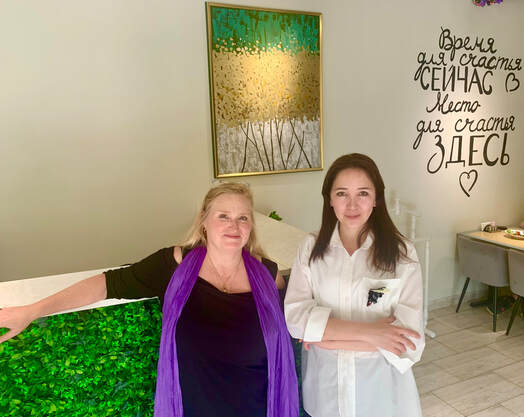 I am in Bukhara, sitting on a rooftop overlooking an amazing city of turquoise and lapis-colored madrassas and mausoleums. The architecture along the ancient Silk Road in Uzbekistan is amazing. And so are the stories. I've now conducted 38 interviews in Uzbekistan since arriving six weeks ago. These are hours-long conversations in which journalists and bloggers and sometimes human rights advocates detail specific threats and intimidations they and others have experienced. Just last week in Tashkent, Anora Sodikova from Rost 24 (photo left) announced she had to delete a video and an article about an Uzbekistan businessman who appeared in the Panama Papers, the huge database showing owners of offshore accounts. A "very powerful person" contacted a colleague of hers and told him if Anora wanted a "quiet life" she'd have to take down the article and video she posted on her website. Fearing for her family, Anora took down the report. But when she refused to take down her Facebook post that said she was in danger, a "sniper blogger" started a smear campaign about her. Anora told me the identity of this "very powerful person" but because she fears he will follow through on his threats I cannot tell you. That's the way it is in Uzbekistan. Everyone knows, but no one can say out loud. Journalists and bloggers are also afraid in the regions. I interviewed several journalists last week in Samarkand. A few of them were defiant and said they didn't care if officials threatened them. Others hemmed and hawed about whether I could tell their story on the record—and in the end they said yes. I've started a growing list of the brave journalists I've met here. At the top of that list is Dilfuza Ibodova, who runs the media website tezkor-yangiliklar.uz/. I was connected to Dilfuza through Tashanov Abdurakhmon, President of Ezgulik, Uzbekistan's official human rights agency. Tashanov called Dilfuza "an active and brave blogger." I didn't know much about her when we first met. (Sometimes it's hard to find information in English on news sites in this country.) For our first interview, Dilfuza and I met at the famous Lyabi House next to the giant fountains in Bukhara this week. Dilfuza brought her teenage daughter as a translator. Her daughter is studying English at the university. The poor girl struggled to keep up with the complex conversation. Even professional translators have problems translating such detailed conversations. Soon all three of us were typing furiously on our phones on Google translate. What was confusing to me is that Dilfuza said the SSS (or SNB or DXX or KGB, there are so many acronyms for the state security services here) didn't contact her. No one ever told her what to write, and she wrote about corruption of officials all the time. Judicial corruption and crime was in fact just about all she wrote. We continued this back and forth for awhile. She said she didn't feel fear and she felt she could write about anything she wanted as long as she provided documentation, also known as "proofs" here. Finally I asked Dilfuza: "Why is it that all these other journalists and bloggers are having trouble with the SSS and you are not?" Then she typed on her phone and held up the translation to me: "They don't bother me because they killed my brother in 2015." Stay-tuned. I'll soon detail more about this brave woman's story and those of others like her. Bahodirxon Eliboyev, a journalist-turn-blogger, and me in a ceramics factory in the Fergana Region of Uzbekistan. I am in Fergana, and I am being tracked. The State Security Services (SSS) contacts journalists after I have met with them. The SSS calls the hotel where I am staying several times a day and asks: Where has she gone? Who is she meeting with? What is the name of her translator? Other guests have even commented to me about these phone conversations. My interview subjects tell me they feel paranoid. Who informed on them? I tick through a small list of people who knew about my interviews. Who would inform on me? I sense a growing paranoia within me. It’s like I’m living in a Soviet time warp—or as one journalist told me—the Soviet Union 2.0. It’s not that I’m not used to such monitoring. Uzbekistan is the tenth post-Soviet country I’ve visited. But in places like Belarus, the KGB were more obvious. They sat across from me in restaurants, their tables spare and stared at me and whomever I was interviewing. Or they openly filmed me at public protests. I’m sure there’s a fat file in Minsk about me. Journalists in former Soviet states often know those who follow them. The security services there make it a point to be seen. Here the security forces’ secrecy feels much more menacing. “Pressure from the security services has only gotten worse over time,” explains Bahodirxon Eliboyev, a journalist turned blogger in Rishtan. Government spying and monitoring has had a chilling effect on both journalists and citizens, he said. His observations echo what journalists in Tashkent have told me. “Our journalism now is getting very dangerous,” Eliboyev said. “The security services can buy some journalists. If the authorities order, journalists write everything that officials want. That’s not journalism. That’s propaganda. Censorship is now in our minds and our hearts.” Unlike most journalists I’ve met in Uzbekistan, Eliboyev speaks openly about pressure journalists face. But he says normal citizens increasingly are afraid to speak out by name about wrongdoings they witness. “Citizens are afraid to talk to journalists because they can lose their jobs,” he said. “We have to teach them not to be afraid.’’ He says that filing stories with anonymous sources doesn’t carry the same authority as quoting people by name. “If I use anonymous names to protect them then it’s not developing journalism here. And I want to develop my country.” Eliboyev is controversial. He was fired from his first two jobs as a reporter after graduating with a journalism degree from Tashkent University. He then started two publications in Tashkent, but each time the prosecutor shut him down, he said. So he turned to human rights activism and blogging. On July 24, 2018, Eliboyev said he wrote a post on his blog wishing President Mirziyoyev a happy birthday and asking him not to forget the millions of Uzbek migrant workers who live in Russia and other countries because they can’t make a living in their home country. That afternoon four SSS officers pounded on the door of his garage apartment where he was napping. “When they saw I was living out of a garage, they asked; ‘Don’t you have a home?’ ” He said he told them: “I can’t work as a journalist. So where can I live? I can’t earn money at the one thing I’m good at.” They warned him he would go to jail if he kept writing about forbidden topics. He said he told them: “I can write whatever I want because your jail is like my garage. But your jail is more comfortable because I don’t need to find bread. You bring me bread. Your jail is for me freedom.” Eliboyev continues to blog about controversial topics. Just last week he says he was visited by the head of the terrorism police and told to delete a post or face a five-day detention and a 1.5 million sum fine. He deleted the post. Two hours after we met, Eliboyev sent me a text. He’d just gotten off the phone with the SSS. They wanted to know what he told me, he said.
“Censorship is inside of themselves,” he says. But self-censorship is real if a media outlet doesn’t want to lose licenses for crossing unknown red lines. At Ruxsor TV, near Fergana city, singer Nuriddin Asqarov says he pumped all his money into the television venture. I asked how the station had handled coverage of the Ukraine war. The general manager, Ibrohim Halimbekov, said the station is only licensed to produce 10 percent news. When I pressed further, I sensed employees in the room getting nervous. “We just cover life,” explained Halimbekov. “We do short reports on what is going on in the world. But we can’t go into detail. We are an entertainment station. We will lose our license.” Fear has forced some bloggers out of business. I met with former blogger Otabek Nuritdinov in his hometown Asaka in the Andijan region. In January 2020, Nuritdinov was detained for 15 days and fined over $1400 on charges of “slander, insult and disorderly conduct.” As Nuritdinov recounted these events, it was hard to imagine the soft-spoken man dressed in a blazer insulting anyone. After he was released, Nuritdinov faced more threats of arrest. In response, he refused to leave his house for six months. Shortly afterward he stopped blogging. At first Nuritdinov was hesitant to meet with me and to speak on the record. He doesn’t want any further problems with the government, he said. I went to Andijan and toured Nuritdinov’s tree nursery and, at his insistence, planted tree seedlings. After our three-hour interview, Nuritdinov agreed to let me use his name. But he asked me to be sure to mention his new venture of growing trees to produce clean air. Though he was still nervous when we parted, Nuritdinov posted pictures of us on his social media accounts. Everyone I met did this, even those who were nervous about being questioned by the SSS. I’m told that bloggers and journalists do this because there’s some cache in meeting with an American journalist. But I suspect there’s also an element of protection, that if they publicly acknowledge such interviews then they can’t be accused of meeting in secret.
She said she leads a clean life, doesn’t smoke or drink to eliminate any chance such vices can be used against her. Most importantly, she backs up her stories with documents, court papers and audio recordings. And she knows where the red lines are: she refrains from writing about the president or his family, religion, LGBT issues and private relationships between two people.
But even her precautions didn’t protect her from being questioned in 2016 by the SSS about why she was writing under pseudonyms in Ozodlik and the BBC. Then in 2020, Madrakhimov was shooting a video at a street market when a representative of the local governor grabbed her and took her to the police. She was detained for two hours while the police grilled her about why she was shooting the video. Finally, the governor called and told police that she was a journalist and to let her go. During last year’s presidential elections, she was asked not to report her observations until after the election, but she refused and posted stories anyway. After our interview, Madrakhimov texted me that the SSS had called her and asked what she was doing in Rishtan. She admitted she had met with me. (She also posted a picture of us on her Facebook account.) If they contact her again, she said, she will write about it in detail on Facebook. What troubles me about the SSS’s surveillance of me, is that my research of challenges faced by Uzbekistan journalists has been approved by the government. My official host is the Agency for Mass Media and Communication. So why did the security services in Fergana covertly track me? Whatever its goal, I doubt it was to make me feel what journalists and bloggers say they encounter every day—fear-induced self-censorship, suspicion of colleagues, and paranoia for their safety. Even I am not telling you everything. We arrive in Tashkent at 2 a.m. both bleary-eyed and wired. The airport looks like so many other post-Soviet airports we have flown into. Our six bags in tow, we are greeted at the exit by the same sorts of taxi drivers we’ve encountered outside countless train stations and airports throughout Eastern Europe, yelling as we pass, eager to charge twice or even five times the normal price of a fare to our hotel. But we are not your average Americans, who if they travel outside North America at all, go to places like London, Paris or Rome. Uzbekistan is our tenth post-Soviet country. My husband and I are here as part of a Fulbright grant from the U.S. State Department. My government is underwriting my research of independent media in post-Soviet countries, where freedom of the press is in its infancy in some countries and non-existent in others. I’m here to see where Uzbekistan falls on that spectrum. This posting follows nearly two years of my husband and I living in Ukraine, where I taught investigative reporting at various universities, and crisscrossed the former Soviet Union interviewing investigative reporters about the challenges they face to report the truth. Some of those journalists are now reporting from the war in Ukraine, others are in prisons in Belarus, and a few remain in hiding in Georgia and Azerbaijan. Now in Tashkent, my husband and I watch news of the fighting in Ukraine. Kyiv is always on our minds. My husband has family in Ukraine and in Belarus, which has joined in the war. I keep track of my former students in Ukraine, and we both correspond with former neighbors, friends and family who sleep in bomb shelters and spend their days cooking for soldiers or dodging bullets to deliver medical supplies. There’s so much about Tashkent that reminds me of Kyiv— the Soviet architecture, the broad streets and underground passages, the mixture of ethnic groups, the signs in Russian and English and the friendly people. I knew from earlier research that the Lenin statues had been torn down in Tashkent and that Uzbekistan’s president is pushing for modernization. The city is clean and well maintained. I love all the trees. But I am stunned when I stumble upon a statue of the Ukrainian poet Taras Shevchenko in front of a colorful Soviet mosaic on Shevchenko Street. In nearby Zulfiya Park, there is a statue of the Belarusian poet Yakub Kolas who only lived in Tashkent for three years. I learn that his image replaced that of the Uzbek poet and journalist Zulfiya for whom the park was named. Why take down a statue of a woman when so many countries are struggling to find women in history to honor? Why are Ukrainian and Belarusian poets honored in Tashkent? I wonder. “This is still an old Soviet town,” a local reporter explains. I hear her voice in my head as we encounter the same bureaucratic systems here that we experienced in Ukraine, Belarus, Kazakhstan and others. The same systems that require lots of forms, registrations, stamps and standing in lines talking to people behind glass. The same demands for gratuities, like the mysterious charges a woman at the post office solicits of me and my husband without explanation but asks of no one else in line. Uzbeks, we are told, are known for being calm. They do seem calm. But last Sunday, my husband and I watched two men get out of their cars and punch each other because one man hadn’t sped through the intersection fast enough. Another guy stopped his car in the middle of the intersection and broke up the fight. In general, I find people in Tashkent polite and helpful. Sometimes these exchanges can be comical. Like the barista at a coffee shop who asked if I wanted “koritsa” with my cappuccino. “You’re asking me if I want a chicken with my coffee?” He smiled and nodded. Then he held up a silver canister to my nose. “Oh, cinnamon,” I said. “Yes, that’s nice.” Consulting Google translator, I learned that chicken is pronounced “kyritsa” and cinnamon is “koritsa.” Good to know. Now I fear I might accidentally ask for a pound of cinnamon at the grocery store. There are other surprises. Because of all the Russian and Belarusian immigrants who have fled here because of sanctions, finding an apartment was especially difficult. We had to pay 30 percent more for rent than initially advertised. Food in the grocery stores is three times more expensive than when I was in Ukraine. On average, I’m spending a little more than $100 a week in grocery stores and in the states I spent $200 a week on food. Restaurants are expensive too. While tasty plov is cheap and plentiful, restaurants like Thai, Italian, Korean and other ethnic foods, charge western prices. Cell phone coverage and taxis are cheap in Tashkent, but home goods are outrageously expensive. I tried to buy a printer, which in the states usually costs about $35 to $50. Here, the cheapest printer I found was $300. The same for other items like bedsheets and coffee grinders, both about double the average price in the states. Since I don’t speak Uzbek, I am delighted to see that many people speak Russian. There are far more fair-haired Europeans here than I expected. Yet I still stand out. When I try to communicate in my bumbling Russian, more times than not the waiter or store employee or the guy standing in line in front of me responds in excellent English. “Where are you from?” they always ask. When I say America, they marvel and tell me that it’s their dream to go there some day. I’ve heard this in so many countries and I am always curious what idyllic life they imagine we live in America. I always tried to rectify my Ukrainian students of this notion. America, I told them, is the land of 60-hour work weeks, two-week vacations, and health care premiums that costs more your monthly car payment. But even with the high cost of life in America, I’m grateful that my country was founded on the principle of freedom of speech. Our media has been practicing independently for centuries. We’ve made a lot of mistakes, but we’ve learned a few things. We’ve developed laws to protect journalists and carved out a set of ethics to make it clear when there is a conflict of interest. That’s why a fledging media in a country like yours is of interest to me. Since I arrived here three weeks ago, I’ve been talking to journalists at several independent media sites. Next week, I’ll be in Fergana to interview journalists there. Eventually I hope to travel to most of the major cities in Uzbekistan. I’ll be reporting my findings here. So, stay tuned. |
Fulbright in Central AsiaFrom March, 2022 to January of 2023, I was a Fulbright Scholar with the U.S. State Department in post-Soviet Central Asia. My previous Fulbright was in Ukraine. For the past six years, I have reported on journalists from post-Soviet countries who have experienced retaliation for reporting the truth. Archives
January 2023
|
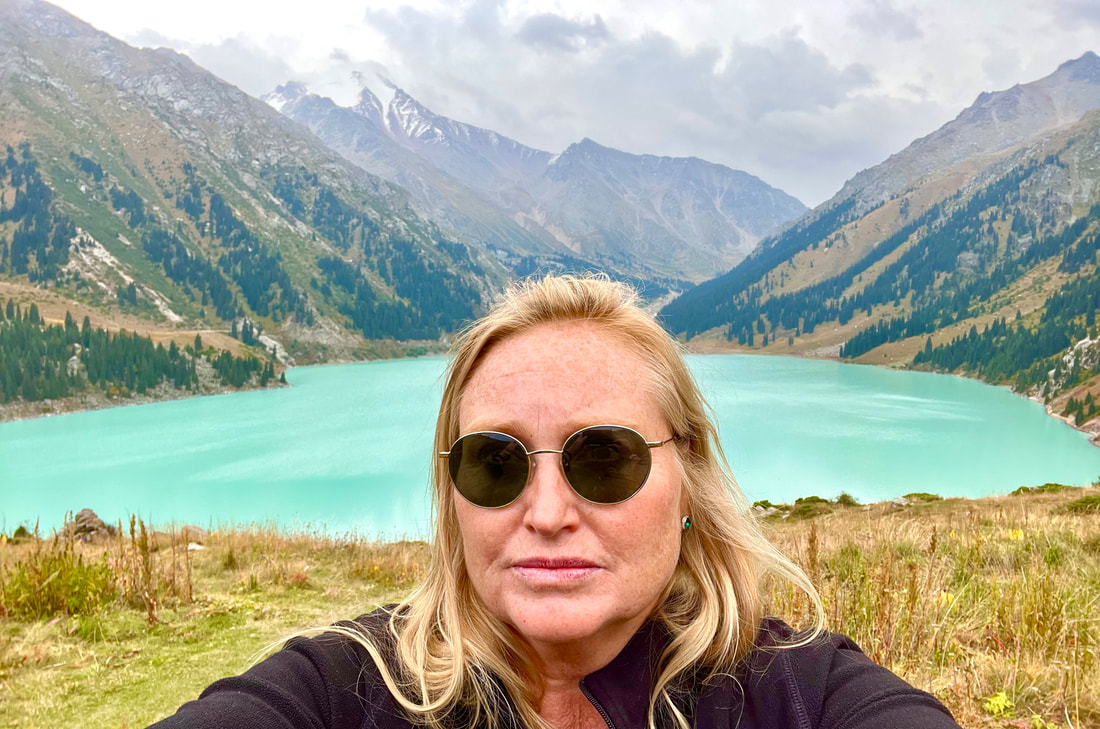
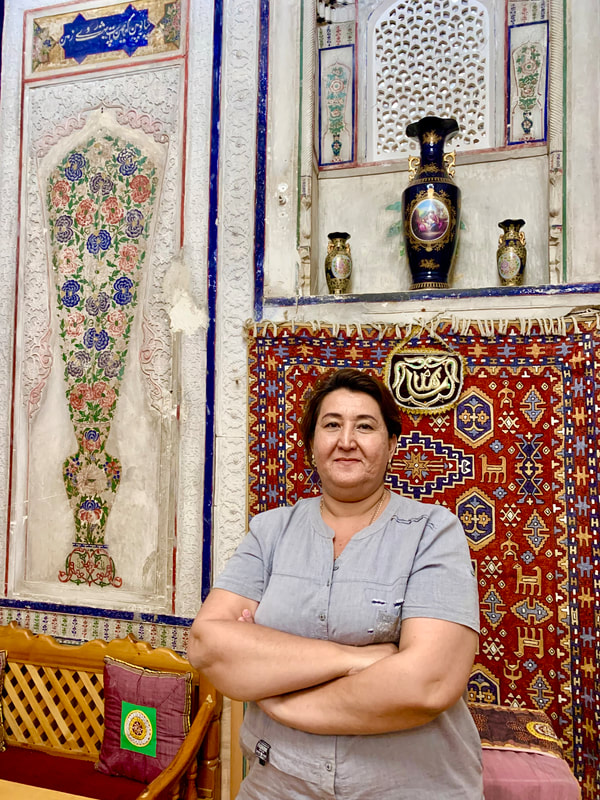
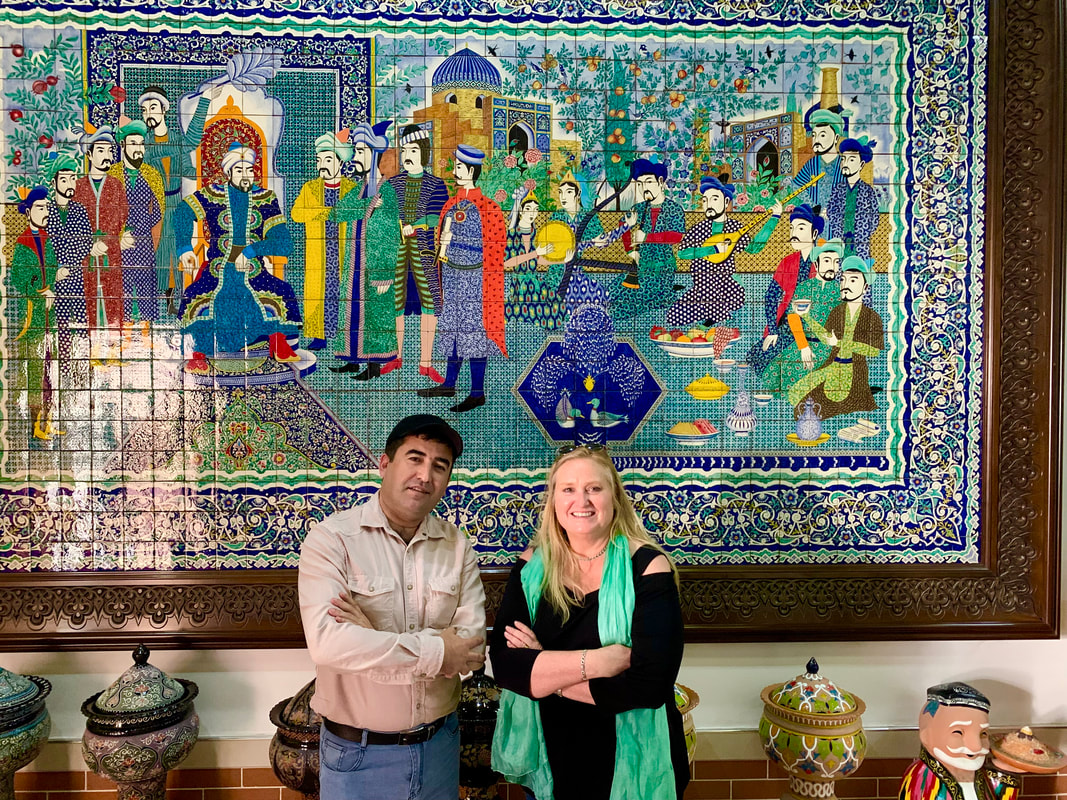
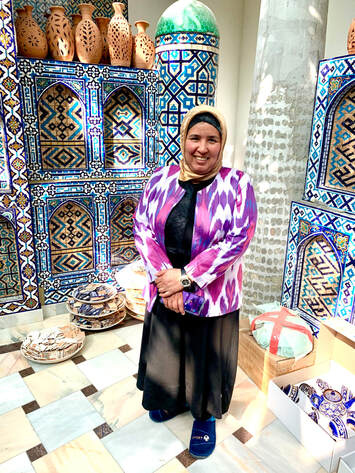
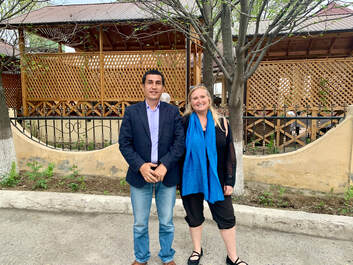
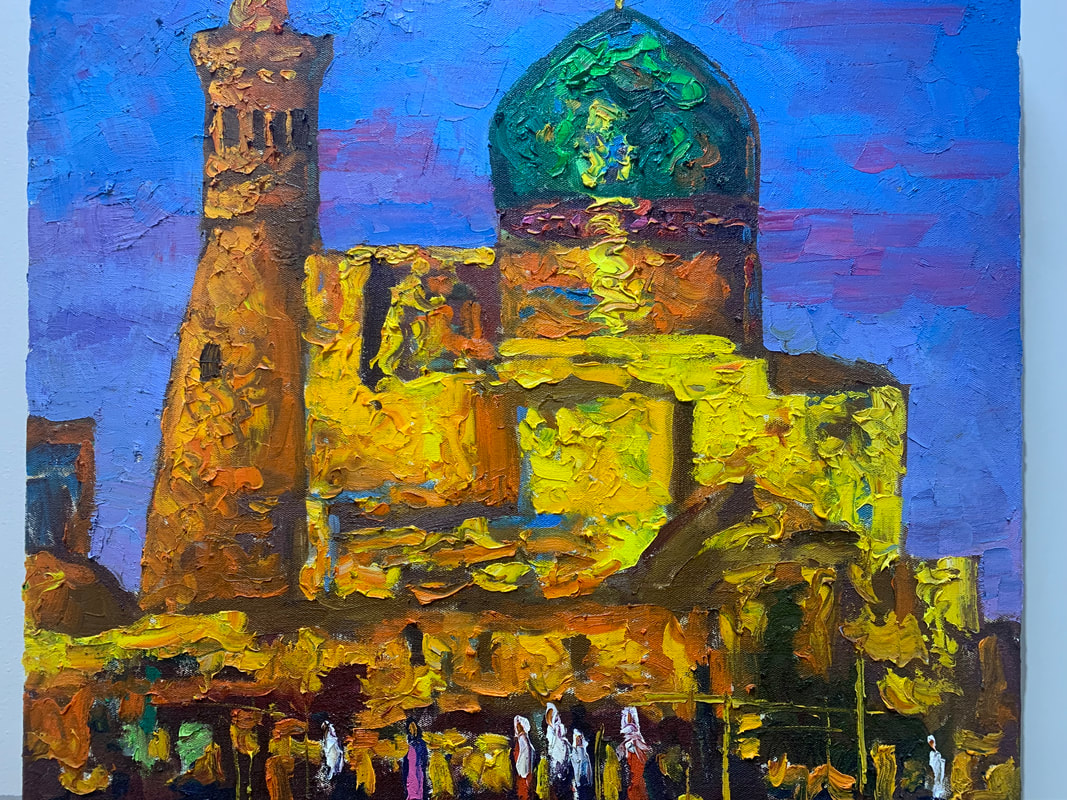
 RSS Feed
RSS Feed
